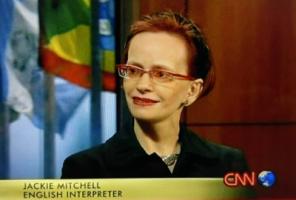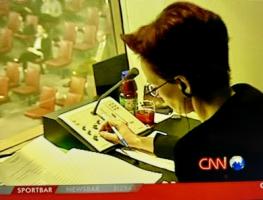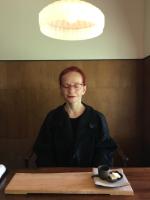
By Jacqueline Mitchell
Nineteen sixty-eight, the year of my matriculation at Oxford University, was an exciting if somewhat scary time to be studying Russian. I had visited the Soviet Union on a trip organized by my school, the Central Newcastle High School for Girls, and despite the constant presence of our Intourist guides and the near impossibility of breaking away from the group, I did manage to have brief conversations in Russian with ordinary Russians. A few phrases exchanged with the cloakroom attendant at the Hermitage, a couple of stumbling attempts to buy an ice cream during the interval at the Bolshoi Theatre: The thrill of trying to communicate in this impossible language remained with me throughout my school days and my time at St Hugh’s. So when the opportunity came about to spend a year in Leningrad as the recipient of a British Council scholarship I jumped at the chance. By then I was pursuing a single Honours degree in Russian, having dropped French after Prelims following a surfeit of Paul Valéry, and was completely enthralled by nineteenth-century Russian novels with Dostoevsky at the very top of my favourites. Not just Dostoevsky, though, because by the time I got to Oxford the works of dissident Soviet authors were beginning to reach the West and were making a huge impact. I remember reading Solzhenitsyn’s Cancer Ward with bated breath and wondering what other treasures were lying in Soviet writers’ drawers unprinted and illegal — and waiting to be discovered. It was a thrilling thought.
The Oxford Russian syllabus in those days was not, however, mainly about novels. Quite the contrary. There was a heavy dose of Common Slavonic Philology as well as the close study of medieval Russian texts which required a fair amount of left brain cudgelling and teeth-gritting. I remember once staying up after term for three weeks in order to sit in Duke Humfrey’s Library and doggedly plough through my tutor Anne Pennington’s thesis on the writing style of the seventeenth-century diplomat Grigory Kotoshikhin. I suppose I hoped that through a mixture of osmosis and hard work I would be able to get to grips with all those ancient военские повести (tales of military campaigns) which seemed so impenetrable and so dull. It sort of worked, but only up to a point. My heart belonged to literature. Except that according to the Oxford syllabus Russian literature stopped at 1917, and it required significant effort on my part to convince Professor Fennell, a historian specializing in fifteenth-century Russia, to allow me to offer Soviet Literature as one of my Schools papers. Consent was reluctantly granted and I embarked on a series of memorable tutorials with Max Hayward, whose recent fame as the translator of Doctor Zhivago was still shining bright. The fact that I was an enthusiastic reader of Solzhenitsyn and that I had contributed three translations of Soviet short stories to an anthology of Novy Mir texts compiled by Michael Glenny, Max’s colleague at St Antony’s College, must have weighed in my favour.

During my final year in Oxford I applied to and was accepted by London University’s School of Slavonic and East European Studies for a post-graduate degree in Soviet Theatre of the 1920s. Part of me wanted to remain forever in the seductive world of academe and the daily joy of entering the old Reading Room at the British Museum and ordering whatever book took my fancy created the illusion that I was cut out to be a scholar. Except that I wasn’t. I found it very difficult to narrow my field down to a manageable thesis topic and was too easily distracted by the vast treasures of the BM’s archives to be anything but a keen amateur. I think Dr Georgette Donchin, my adviser and mentor at SSEES, realized this, so when I happened to see a notice outside the Senate House library calling for applicants to take an aptitude test for simultaneous interpretation she did not try to discourage me. Pat Longley, the director of the interpretation course at the then Polytechnic of Central London, was a gruff, cigar-chomping Irish woman who did not mince words when offering an assessment of one’s aptitude, or lack thereof. On the basis of my Russian test she thought I might have what it took and was prepared to offer me a place but only on condition that I polish up my rusty French. It had been a few years since my copy of Eupalinos; L’âme et la Danse landed with a thud on my pile of deaccessioned Prelims texts, never to be opened again, so I did not dispute Mrs Longley’s judgement. I spent that summer in France and returned to London eager to embark on the six-month course.
Looking back, I am amazed that I survived the gruelling hours in the PCL language laboratory listening to and attempting to render into acceptable English rapid torrents of UN speeches in French and Russian only to be interrupted by Longley’s scathing remarks. “Rewind and repeat, damn it!” No one dared utter a peep because of her reputation as an ace interpreter so we all would just take a deep breath, rewind the tape and repeat the passage. Again and again. Was this sufficient preparation for doing the real job when not merely Pat Longley was listening in but a conference room full of delegates? I think on balance that it was, except that you could never rewind the tape and start over. After graduating from the PCL, my first few months of the interpreter training programme at the UN Office in Geneva were pretty terrifying and there were times I thought I simply would not make it. I seemed to spend most of my time at first in technical sub-groups of the UN Economic Commission for Europe (the Working Party on the Carriage of Eggs-in-Shell and the Committee on Intermodal Transport are forever etched in my memory) where the stakes were deemed to be lower than in the more political bodies. Eventually, as I gained confidence and experience, I was assigned to the Human Rights Commission or, on a couple of occasions, to the World Health Organization where remembering the names of diseases in three languages and recognizing them when they came flying at you in French or Russian offered a particular kind of challenge.

At a certain point during my training something in me shifted: I began to enjoy the demands of the English booth rather than simply to dread each meeting, and so with the encouragement of Basil Yakovlev, the Chief of the Interpretation Service, I applied for a transfer to UNHQ in New York, which to my mind sounded infinitely more glamorous and exciting than provincial, dull Geneva. Given the somewhat dubious reputation of New York City in the 1970s, most interpreter colleagues were requesting transfers to, not from, Geneva, with the result that my application was granted almost immediately, albeit with the warning to be sure to live within four blocks of the UN, thus avoiding potentially dangerous subway commutes, and never to carry more than twenty dollars in my pocket in case of inevitable muggings. Nothing daunted, I arrived in New York in July of 1976 and embarked on yet another steep learning curve, made even more challenging by the then Chief of the NY Interpretation Service whose view of anyone not born Russian — preferably White Russian — and daring to interpret from his mother tongue, was openly disdainful. He was in the habit of listening to English booth interpreters (he had a monitoring machine — the Squawk-Box — blaring away on his desk most of the day) and leaving notes, usually critical, in one’s pigeon-hole. Very occasionally he would offer a word of praise.
Monitoring one’s performance from Russian was not just the purview of The Boss however. Whenever any Russian speaker took the floor there was always someone in the delegation whose job it was to compare the original with the English and stop the speaker if a mistake was made. And remember, there was a lot more Russian to interpret when the Soviet Union still existed: the USSR, the Belorussian SSR and the Ukrainian SSR would invariably speak Russian, but so, on occasion, would the German Democratic Republic (oh, that accent!), the Polish People’s Republic and even Afghanistan following the 1979 invasion. The potpourri of accents combined with wrong word-stresses and poor diction made for some difficult moments in the booth. And yet, I can still recall the thrill of having performed well in some high-level meeting and the conviction that despite everything there was no other job I would rather do. I’m not sure Professor Fennell would have approved of my career choice but I never once regretted abandoning the dream of an academic life for ‘seat-of-your-pants translation’, as one of my colleagues put it. What more practical way to keep Russian and French central to my life than to continue to hear them every day and try to come up with better ways to convey ideas by interpreting them?